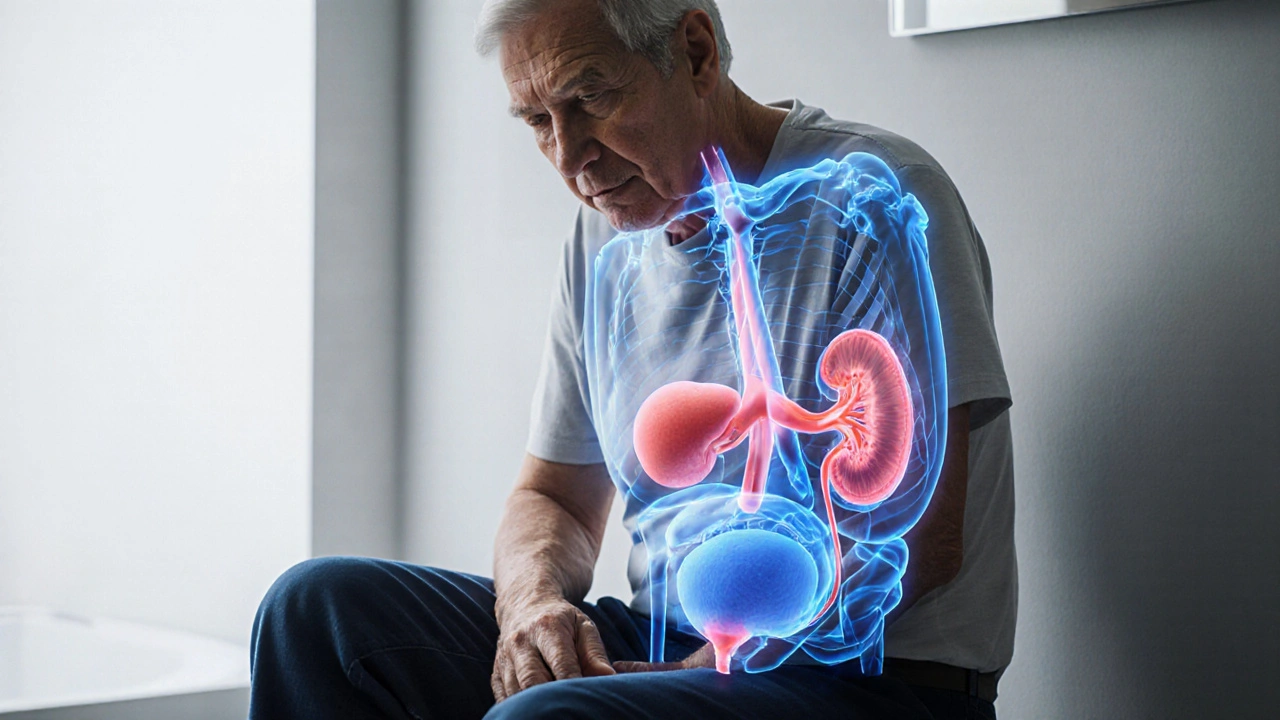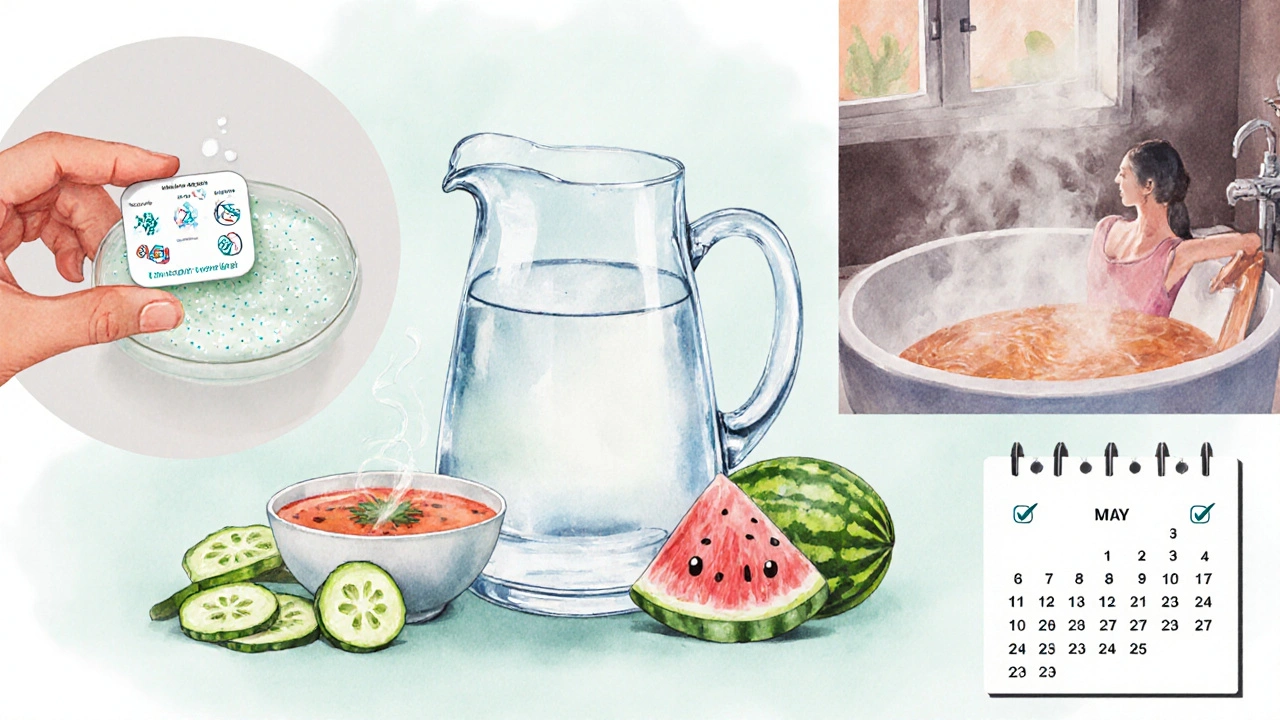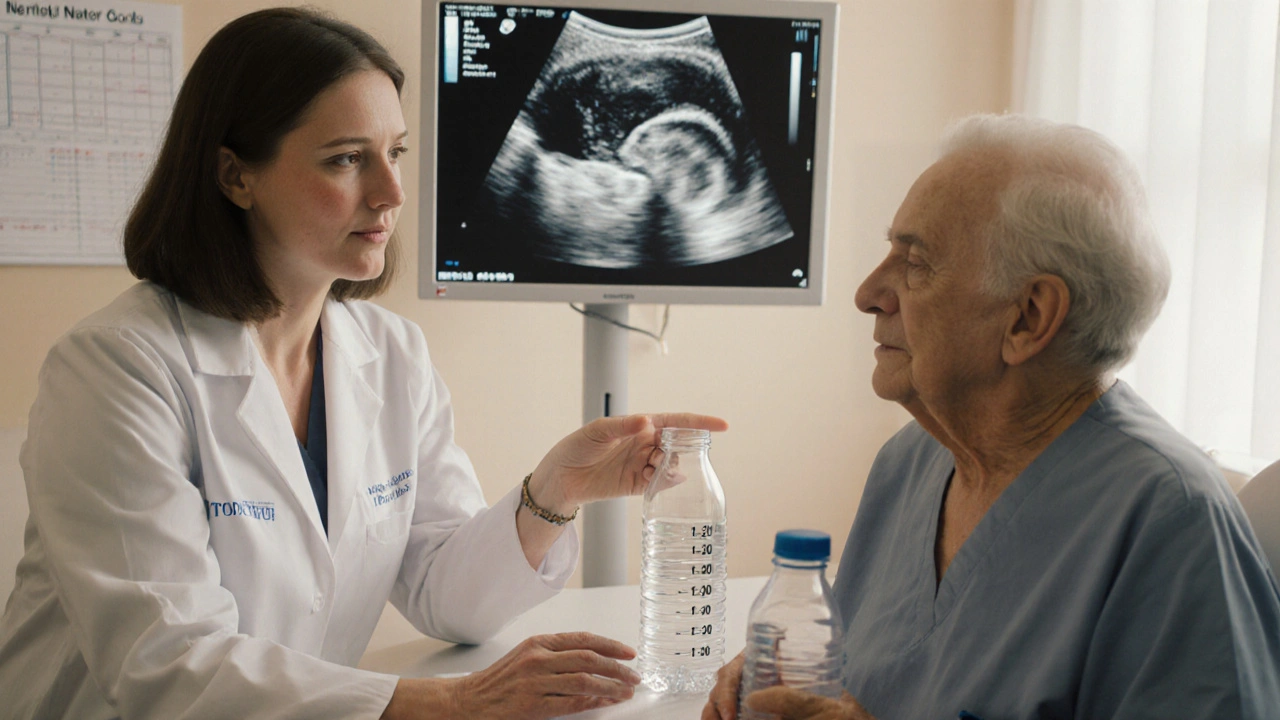How Dehydration Causes Difficulty Urinating - Risks & Relief
 Oct, 10 2025
Oct, 10 2025
Dehydration & Urination Symptom Checker
Your Hydration Assessment
Common Symptoms for Your Level:
Quick Takeaways
- Even mild dehydration can shrink urine volume and make it hard to start a stream.
- The bladder needs enough fluid to stretch; without it, muscles contract too tightly.
- Electrolyte imbalances and high antidiuretic hormone (ADH) levels worsen the problem.
- Simple habits - sip water, watch caffeine, and balance electrolytes - often solve the issue.
- Seek medical help if you can’t empty your bladder, have pain, or notice blood.
How Dehydration Affects Urination
When the body loses more water than it takes in, dehydration is a state of reduced total body water that impairs normal physiological processes. One of the first systems to feel the squeeze is the urinary tract.
The kidneys filter blood to produce urine. They rely on a steady blood volume to maintain glomerular filtration rate (GFR). With less fluid, blood becomes thicker, GFR drops, and the kidneys produce less urine. Less fluid reaching the bladder a muscular sac that stores urine until it is expelled means the organ never fully stretches. A partially filled bladder triggers higher pressure on the sphincter muscles, making it harder to relax and start the stream.
At the hormonal level, dehydration spikes antidiuretic hormone (ADH) a hormone that tells kidneys to retain water. While ADH helps conserve water, it also reduces urine output, compounding the low‑volume problem. The combined effect of reduced fluid volume, heightened sphincter tone, and hormonal water‑saving signals is what many describe as “difficulty urinating.”

Common Signs When Dehydration Leads to Urinary Issues
Not everyone will notice the same symptoms, but several patterns emerge:
- Weak or intermittent stream - you start, stop, and have to push.
- Straining to begin - a sensation of a “balloon” that won’t empty.
- Frequent trips to the bathroom - tiny amounts of urine, often called “spritzing.”
- Dull pelvic pressure - the bladder feels full even after you’ve gone.
- Darker urine - concentrated urine is a clear sign of low fluid intake.
When these signs appear together, they usually point to a cascade that starts with dehydration and ends with urinary retention the inability to completely empty the bladder. Mild retention is often self‑limiting, but chronic episodes can stress the kidneys and lead to infections.
Why Some People Experience More Trouble
Several factors make the dehydration‑urination link stronger for certain groups:
- Age - Older adults have reduced thirst response and weaker bladder muscles.
- Medications - Diuretics, antihistamines, and some antidepressants dry out the urinary tract.
- Medical conditions - Diabetes, multiple sclerosis, and prostate enlargement already compromise urine flow.
- Electrolyte imbalance - Low sodium or potassium can alter muscle contractility in the bladder.
- High‑intensity exercise - Sweat loss outpaces fluid replacement, especially in hot climates.
Understanding these risk factors helps you tailor prevention. For example, a senior on a thiazide diuretic should schedule regular water breaks, while an athlete should include electrolyte drinks.
Practical Steps to Prevent & Relieve Difficulty Urinating
Most people can fix the problem with everyday habits. Below is a step‑by‑step plan that targets the root causes.
- Track your fluid intake. Aim for at least 2L (about 8 cups) of water per day, more if you exercise or live in a hot zone. Use a reusable bottle with time markers.
- Choose water‑rich foods. Cucumbers, watermelon, and soups add up to 300‑500ml of fluid without extra effort.
- Limit bladder‑irritants. Cut back on caffeine, alcohol, and overly salty snacks, which increase ADH release and draw water out of cells.
- Balance electrolytes. A pinch of sea salt or an electrolyte tablet helps the bladder muscles contract and relax smoothly.
- Practice timed voiding. Go every 3‑4hours, even if you don’t feel a strong urge. This trains the bladder to empty fully.
- Warm the pelvic area. A warm sit‑z bath or heating pad relaxes sphincter muscles, making the stream start easier.
- Stay upright after voiding. A brief walk helps any residual urine drain, reducing retention risk.
If you’ve already felt the pinch, try a “double‑void” technique: urinate, wait a minute, then try again. This often squeezes out the last few drops that stayed trapped due to low bladder volume.

When to Seek Medical Help
Most cases resolve with the steps above, but certain red flags demand professional evaluation:
- Inability to pass any urine for more than 6hours.
- Severe pain in the lower abdomen or back.
- Blood in the urine (hematuria).
- Frequent urinary infections (three or more per year).
- Persistent bladder feeling full after voiding.
Doctors may run a urinalysis a lab test that checks urine for infection, blood, and concentration, an ultrasound of the kidneys, or a post‑void residual measurement. Treatment can include medication to relax the bladder neck, catheterization for acute retention, or targeted fluid‑replacement regimens.
Quick Reference Table
| Hydration Status | Typical Urine Volume (ml per day) | Urine Color | Key Symptoms |
|---|---|---|---|
| Well‑hydrated | ≥1500 | Light straw | Easy start, full stream |
| Mild dehydration | 800‑1500 | Dark amber | Weak start, occasional straining |
| Moderate dehydration | 400‑800 | Honey‑brown | Frequent trips, feeling of incomplete emptying |
| Severe dehydration | <400 | Deep orange | Acute retention, pelvic pain, possible blood |
Frequently Asked Questions
Can drinking coffee worsen difficulty urinating?
Yes. Caffeine is a mild diuretic that increases ADH release and can dry out the bladder lining, making the sphincter tighter. Cutting back to one cup a day usually improves symptoms.
Is it safe to self‑catheterize if I can’t pee?
Self‑catheterization should only be done under medical instruction. Incorrect technique can cause infection or urethral injury. If you cannot void for more than a few hours, seek emergency care.
How much water should I drink during a long run?
Aim for 150‑250ml of water every 20minutes, plus an electrolyte drink if you sweat heavily. Adjust based on temperature and personal sweat rate.
Do certain medications increase the risk?
Antihistamines, certain antidepressants, and some blood pressure drugs have anticholinergic effects that dry the urinary tract. Talk to your doctor about alternatives if you notice trouble urinating.
Can an electrolyte imbalance cause urinary retention?
Yes. Low potassium or sodium can impair bladder muscle contraction, leading to incomplete emptying. Balanced electrolyte intake is essential, especially when sweating a lot.

Yassin Hammachi
October 10, 2025 AT 21:03Hydration is more than a metric; it is a quiet dialogue between our cells and the environment.
When fluid intake dwindles, the conversation falters, and the kidneys, as vigilant custodians, begin to conserve.
This conservation manifests as reduced urine output, which in turn leaves the bladder under‑filled.
An under‑filled bladder does not stretch fully, and the sphincter muscles remain tense, making the initiation of flow uneasy.
Moreover, dehydration triggers an increase in antidiuretic hormone, a signal that tells the kidneys to retain water even more.
The hormone’s protective intent paradoxically deepens the problem of low urinary volume.
Think of it as a feedback loop: less water leads to higher ADH, which then yields even less urine.
Over time, repeated episodes can condition the bladder muscles to stay tighter, a subtle form of learned “muscle memory.”
This is why some people notice a progressive difficulty rather than an isolated hiccup.
Lifestyle factors such as caffeine, alcohol, and high‑salt meals amplify the loop by prompting further fluid loss.
Age also plays a role, as older adults often feel thirst less acutely and possess weaker detrusor muscles.
Medication like diuretics may appear helpful yet can mask the underlying fluid deficit if not paired with adequate drinking.
The practical takeaway is simple: keep the bladder comfortably filled, and the body will thank you with an effortless stream.
Simple habits-regular sips, water‑rich foods, and mindful voiding schedules-serve as gentle reminders to maintain that balance.
In the grander picture, honoring our hydration needs is an act of respect toward the finely tuned systems that keep us functional every day.
Michael Wall
October 10, 2025 AT 21:36We all have a responsibility to treat our bodies with basic respect, and that starts with drinking enough water.
Ignoring simple signals like a dry mouth or a sticky feeling is a form of neglect that we should avoid.
Choosing water over sugary drinks is a straightforward way to keep the bladder happy.
It's a moral duty to stay hydrated, especially when we know the consequences for urination.
Christopher Xompero
October 10, 2025 AT 22:26Man, I swear if you think dehydration is just a little inconvenience, you're living in a fantasy!
The bladder turns into a steel trap, and you end up fighting a battle every time you try to pee.
It's like your body is playing a cruel joke, making you strain like you're lifting a weight you never signed up for.
Stop ignoring the signs, drink water already, or you'll be stuck in this miserable cycle forever.
Honestly, it's pathetic how many people just brush it off as "just a bit dry".
Irene Harty
October 10, 2025 AT 23:16The pattern of emphasizing hydration in mainstream health articles is not merely educational; it serves a subtle agenda to keep populations compliant with industry‑driven water sales.
When you trace the funding streams, you discover that large beverage conglomerates benefit from the narrative that "more water equals better health".
This creates a feedback loop where consumers are nudged toward purchasing branded bottled water, all while the underlying issue of urinary retention is downplayed.
Such manipulation underscores the necessity of critical vigilance when consuming health information.
Jason Lancer
October 11, 2025 AT 00:06Another click‑bait health guide full of obvious advice.
Brooks Gregoria
October 11, 2025 AT 00:56While dehydration certainly influences urine output, it's a stretch to claim it's the primary culprit behind difficulty urinating for most people.
Many cases stem from underlying urological conditions like prostate enlargement, neurogenic bladder, or medication side effects, which are independent of fluid intake.
Focusing solely on drinking more water oversimplifies a complex physiology and may even exacerbate symptoms in patients prone to over‑hydration.
Therefore, a balanced approach that assesses both hydration status and potential anatomical or neurological factors is essential.
tierra hopkins
October 11, 2025 AT 01:46I hear you, and I think adding a cute water‑reminder app can make staying hydrated feel less like a chore and more like a friendly habit.
Ryan Walsh
October 11, 2025 AT 02:36Hey, don't stress too much – just keep a water bottle at your desk and sip regularly, and you'll probably notice the stream getting back to normal.
Kiersten Denton
October 11, 2025 AT 03:26Interesting point about over‑hydration; it's true that drinking too much can sometimes lead to a diluted electrolyte balance, which might also affect bladder function.
Karl Norton
October 11, 2025 AT 04:16All that philosophical talk is nice, but at the end of the day you still have to get up and actually drink water, otherwise the bladder stays stubborn.
Ashley Leonard
October 11, 2025 AT 05:06That's a neat suggestion! Just make sure the app uses gentle nudges rather than aggressive alerts, so it stays helpful.
Ramanathan Valliyappa
October 11, 2025 AT 05:56That sentence lacks substantive content and repeats common clichés.